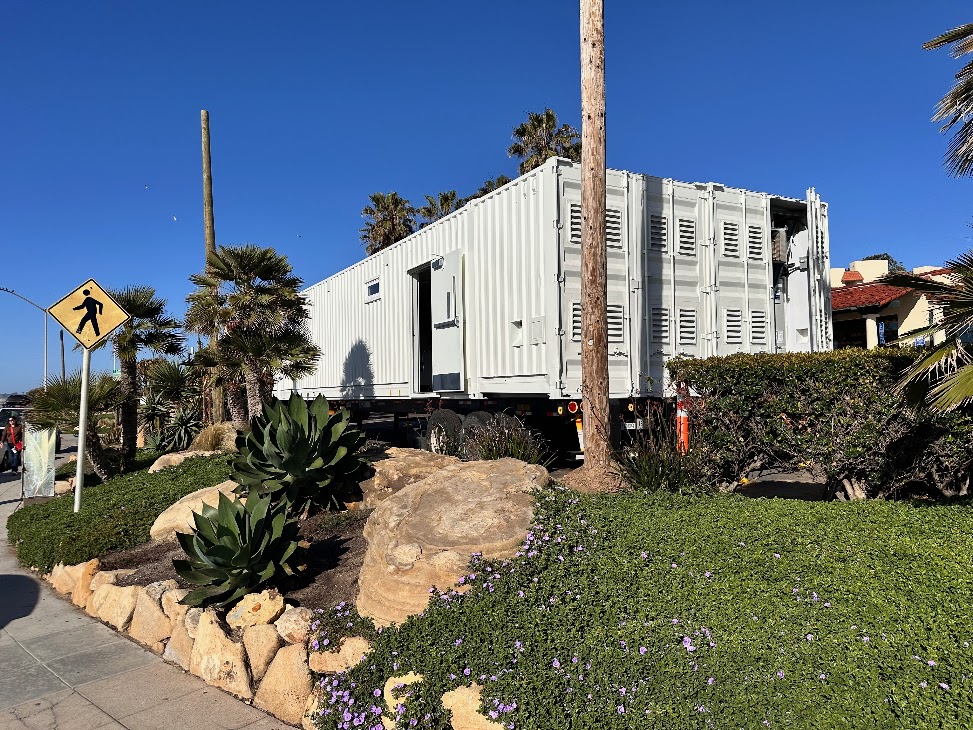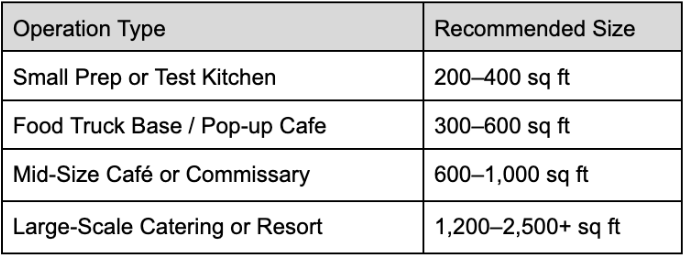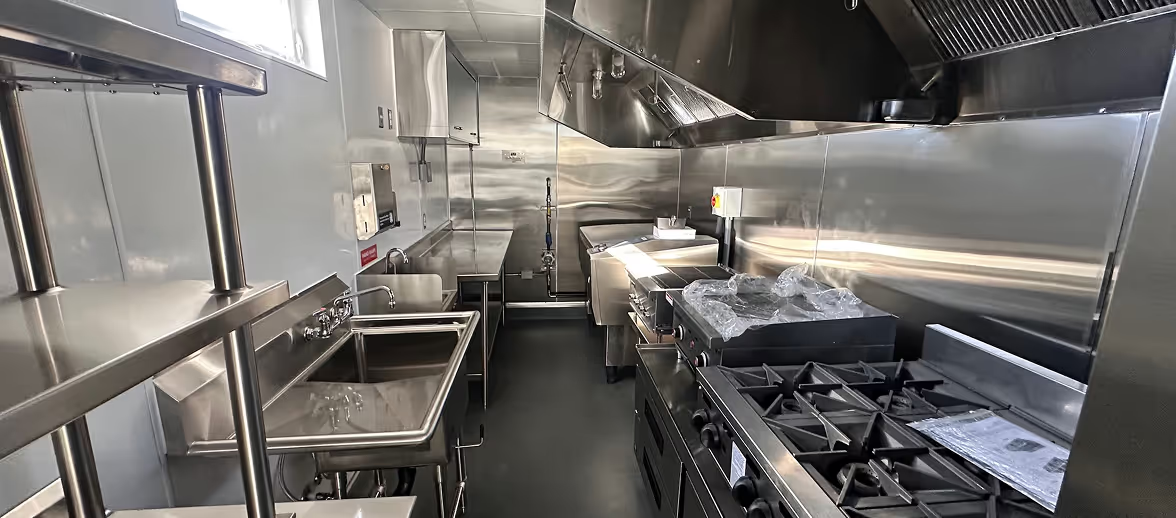
Introduction
Renting a commercial kitchen isn’t a one-size-fits-all choice, especially in hospitality. With formats ranging from mobile units to commissary spaces and modular builds, the best option depends on your specific needs. Whether you're coordinating a renovation at a resort or scaling operations during peak season, selecting the right kitchen setup can make or break your efficiency. The global market for temporary kitchen rentals is booming: projected to reach $8.7 billion by 2033, growing at a 7.7% CAGR. This surge reflects the growing demand for flexible, efficient kitchen infrastructure among hospitality operators navigating seasonal spikes, renovations, and event-driven services.
This article covers the key types of commercial kitchens for rent, how to choose the right size for your operation, and the permit essentials every hospitality business should consider.
Why Hospitality Operators Are Choosing to Rent
From luxury hotels to catering startups, hospitality professionals rely on commercial kitchens for scale, safety, and service. But constructing a permanent kitchen isn’t always feasible. Renting provides:
- Speed: Rapid deployment without long construction timelines
- Flexibility: Short or long-term use, on-site or remote
- Cost control: Eliminates the need for large capital investment
Whether you're handling seasonal demand, renovating your main kitchen, or launching a new concept, rentals allow you to stay operational without delay.
What’s Fueling Kitchen Rental Growth in 2025?
In 2025, the demand for rental kitchen infrastructure continues to rise due to:
- Growth of delivery-focused business models and ghost kitchens
- Popularity of mobile and pop-up food concepts
- Adoption of lean, low-risk startup strategies
- Increased need for temporary kitchens during renovations or emergencies
This demand is driven in part by the online food delivery market, which is projected to reach $466 billion globally by 2025. This evolving landscape has given rise to a range of rental solutions, each tailored to different use cases in hospitality.
.jpeg)
Key Types of Commercial Kitchens for Rent
Choosing the right type of commercial kitchen rental depends on your operational model, volume, location, and whether you're in a transitional or long-term growth phase. Here’s a breakdown of the most widely used kitchen types in 2025:
1. Shared-Use Kitchens
Shared-use kitchens are licensed commercial spaces rented by the hour or shift to multiple food businesses. Ideal for bakers, caterers, small-batch producers, and food truck operators, these spaces offer affordable access to professional equipment without long-term commitment.
Pros:
- Budget-friendly pay-as-you-go model
- Access to commercial-grade appliances and cold storage
- Flexibility for startups and experimental concepts
Cons:
- Limited availability during peak hours
- Shared scheduling and space constraints
Best for: Early-stage entrepreneurs, test launches, and part-time production.
2. Private Commercial Kitchen Rentals
Private kitchens are exclusive-use spaces leased to a single business. These kitchens provide autonomy, making them suitable for high-volume operations or companies requiring strict control over workflow, compliance, and brand confidentiality.
Pros:
- Full control over scheduling, layout, and hygiene practices
- Better suited for scaling or consistent production
- Easier to meet health and safety compliance
Cons:
- Higher rental costs compared to shared facilities
- Tenant is often responsible for maintenance and equipment care
Best for: Meal-prep companies, catering businesses, and brands transitioning to dedicated facilities.
3. Commissary Kitchens
Commissary kitchens are licensed commercial facilities designed to support mobile food vendors, especially food trucks and delivery-based models. They offer shared or semi-private spaces with storage, cleaning, and prep capabilities. Many are strategically located near urban delivery hubs for operational efficiency.
Pros:
- Turnkey support for food trucks (storage, sanitation, waste disposal)
- Flexible rental terms: daily, weekly, or monthly
- Lower overhead than building a base kitchen
Cons:
- May be shared with other operators
- Some restrictions on prep hours or equipment usage
Best for: Food truck operators, delivery-focused brands, and mobile food vendors needing off-site prep and storage.
4. Incubator Kitchens
Incubator kitchens combine shared kitchen space with business development support, such as mentorship, training, and access to distribution networks. They’re typically operated by culinary schools, nonprofits, or food accelerators.
Pros:
- Subsidized rental rates and financial accessibility
- Business resources and networking support
- Low-risk environment to test and grow food brands
Cons:
- Competitive application process in some areas
- Limited production scalability once business grows
Best for: First-time entrepreneurs, food startups, and early-stage CPG (consumer packaged goods) brands.
.jpeg)
5. Ghost Kitchens / Cloud Kitchens
Ghost kitchens are delivery-only commercial kitchens with no dine-in service. Often integrated with third-party apps, they serve as fulfillment hubs for virtual brands or off-premise dining arms of existing businesses.
Pros:
- Streamlined logistics for high delivery volume
- Lower real estate and labor costs than brick-and-mortar restaurants
- Can support multiple brands in one location
Cons:
- No walk-in traffic or brand visibility
- Dependent on third-party delivery platforms for success
Best for: Virtual restaurants, multi-brand operators, and food businesses focused on delivery.
Note: Ghost kitchens could represent a $1 trillion global market by 2030, with widespread adoption across the U.S.
6. Pop-Up Kitchen Spaces
Pop-up kitchens are temporary setups created for events, seasonal operations, or pilot launches. They may be housed in modular trailers, retrofitted containers, or short-term leased spaces.
Pros:
- Quick deployment for short-term needs
- No long-term lease or construction required
- Ideal for pilot programs and location testing
Cons:
- Limited infrastructure compared to permanent kitchens
- Temporary utilities or permits may be needed
Best for: Hospitality venues hosting festivals, pilot restaurant concepts, and F&B service during facility transitions.
7. Mobile Commercial Kitchens
Mobile kitchens are self-contained commercial units built on trailers or modular platforms. Fully equipped and compliant, they can be deployed anywhere - making them perfect for hotels, resorts, and venues that need temporary or mobile foodservice.
Pros:
- Delivered turnkey and operational in days
- ADA, NSF, and fire-code compliant
- Fully customizable with cooking, refrigeration, and dishwashing equipment
Cons:
- Requires access to utility hookups (water, gas, electrical)
- Rental cost can be higher for short deployments
Best for: Hotels during renovations, outdoor event catering, seasonal expansions, and emergency foodservice continuity.
Note: Explore real-world projects here.
.jpeg)
How to Choose the Right Commercial Kitchen for Rent
Selecting the right kitchen involves more than just location or availability, it’s about aligning space, infrastructure, and format with your operational model. Here’s how to make the right decision.
1. Match the Kitchen Type to Your Business Model
Start by defining how your business operates:
- Are you offering dine-in service, off-site catering, or delivery-only?
- Is the operation seasonal, long-term, or transitional?
- Do you need mobility or fixed infrastructure?
Your answers help narrow down whether you need a shared-use kitchen, mobile unit, or a private, long-term facility.

2. Know Your Commercial Kitchen Size Requirements
Kitchen size should scale with your output volume, menu complexity, and staffing needs.

When sizing your space, account for:
- Equipment footprint
- Storage zones (dry, cold, frozen)
- Prep and cooking lines
- Dishwashing and sanitation
- Staff circulation and safety buffers
Note: OSHA recommends maintaining clear, uncrowded workspaces in commercial kitchens to reduce injury risk and improve productivity.
3. Evaluate Utilities, Equipment, and Customization
Not all kitchens are plug-and-play so ensure the infrastructure matches your operation. Key considerations include:
- Plumbing and electrical capacity for commercial appliances
- Gas hookups for stoves or fryers
- Proper ventilation and fire suppression systems (NFPA/ADA compliant)
- Storage capacity (walk-in freezers, dry shelving)
- Custom layout flexibility to optimize workflow
A well-matched kitchen improves output, ensures compliance, and reduces retrofitting costs.
.jpeg)
Pros and Cons of Renting vs Building a Kitchen
Choosing between renting and building a commercial kitchen comes down to cost, speed, flexibility, and long-term business goals. Here’s how both options compare:
Cost Comparison

Note: Rental rates vary by region, facility type, and lease terms. Long-term leases often offer discounted rates compared to short-term contracts.
Speed of Deployment
- Renting: Operational in 1–4 weeks, ideal for urgent needs or temporary operations.
- Building: Takes 4–12 months, depending on permitting, construction, and inspections.
Rentals allow hospitality groups to stay agile by responding quickly to renovations, emergencies, or seasonal demand without disrupting service.
Maintenance and Ownership
With rental kitchens, maintenance is typically handled by the provider or is very minimal, minimizing downtime and surprise expenses. In contrast, owning a kitchen means:
- Managing repairs and upkeep
- Budgeting for replacements and inspections
- Handling code compliance and infrastructure upgrades
While ownership provides total control and long-term equity, it also comes with higher capital risk and ongoing resource commitments.
Note: A 2023 study found that operators choosing kitchen rentals over permanent builds cited capital expenditure reduction, time savings, and lower maintenance responsibility as key drivers.
.jpeg)
Permit & Licensing Requirements
Renting a commercial kitchen simplifies the infrastructure but not your legal obligations. Whether using a shared facility, a private kitchen, or a mobile unit, operators must meet local, state, and federal regulations to remain compliant with food safety, zoning, and fire protection standards.
Required Permits & Licenses
Your exact requirements may vary by jurisdiction and kitchen type, but most hospitality operators will need:
- Food Handler’s License for staff involved in food prep or service
- Health Department Permit confirming sanitation, refrigeration, and hygiene compliance
- Fire Department Inspection for suppression systems, ventilation, and safety exits
- Waste Disposal Certification for grease and wastewater management
- Zoning Approval to ensure your operation is permitted at the chosen site
For mobile units like trailers or modular kitchens, additional permits may include:
- State mobility permits and parking approvals
- Propane/gas inspection and fire clearance for onboard systems
- Health inspection at each location of use
Note: Need state-specific guidance? Visit the SBA’s permit resource hub.
Health & Food Safety Compliance
Regardless of the kitchen format, your operation must follow the FDA Food Code and local health department rules. These standards generally require:
- NSF-certified surfaces and dishwashing areas
- Designated handwashing and sanitation stations
- Proper cold and hot holding equipment
- Clear workflows that separate raw and cooked foods to prevent contamination
While the kitchen provider may supply compliant infrastructure, you are still responsible for ensuring day-to-day food safety practices and recordkeeping.
Fire Safety & Ventilation Requirements
Fire safety is a non-negotiable. Most commercial kitchens, especially those with fryers or grills, must meet NFPA 96 standards, which cover:
- Type 1 hood and duct systems over grease-laden appliances
- Automatic fire suppression systems
- Regular grease trap maintenance and exhaust cleaning
- Clearly marked emergency exits and evacuation signage
Temporary vs. Long-Term Use Considerations
Permit needs may shift depending on how long you plan to rent the kitchen. For example:
- Short-term rentals (e.g., events or seasonal kitchens) may only require a temporary food facility permit
- Mid- to long-term rentals often need a full business operating license, repeat health inspections, and zoning compliance
- Mobile operations may need to reapply or renew permits per site or municipality
Tip: Clarifying your rental term early will help avoid delays during inspection or setup.
.jpeg)
Why Mobile Kitchens Offer a Strategic Edge
For hotels, resorts, and event-driven venues, maintaining uninterrupted foodservice during periods of change is critical. That’s why mobile commercial kitchens have become a strategic asset in hospitality operations.
Whether you're managing a kitchen renovation, hosting a large-scale event, or responding to an emergency, mobile kitchens offer rapid deployment, low disruption, and full operational capability. These self-contained, code-compliant units eliminate the need for permanent construction and can be scaled based on seasonality, guest volume, or geographic needs.
Hospitality operators are increasingly using mobile kitchens to:
- Support dining operations during facility upgrades
- Add outdoor or remote foodservice at golf clubs, pool decks, and seasonal venues
- Serve as emergency replacements after fire, flood, or equipment failure
Because they’re modular and customizable, mobile kitchens can be configured with fryers, combi ovens, walk-in coolers, dish stations, and more: delivering a true commercial-grade experience with none of the construction delays.
How Mobile Culinaire Offers a Distinct Advantage
Mobile Culinaire delivers more than a temporary kitchen, it provides strategic, full-service foodservice continuity solutions for hotels, resorts, and hospitality groups. With over 400 deployments nationwide and every unit manufactured in-house, Mobile Culinaire is the trusted partner for operations that can’t afford to pause.
Industry-Leading Experts
With years of experience and over 400 trailers built, Mobile Culinaire specializes exclusively in mobile kitchen trailers. This laser focus means we understand the complex needs of hospitality operators, from compliance hurdles to spatial constraints and peak guest volume service.
Whether you're managing a fire-damaged kitchen, responding to a utility failure, or planning a renovation, our team delivers custom-tailored solutions with speed and precision so your foodservice never misses a beat.
Commercial-Grade Quality
Every Mobile Culinaire unit is engineered for durability, safety, and 24/7 performance in high-volume environments. Unlike retrofitted trailers or food trucks, these mobile kitchens are built from the ground up to:
- Meet NSF, ADA, and NFPA 96 standards
- Support complex hotel and resort menus
- Operate safely and efficiently under heavy, continuous use
This attention to detail ensures that your temporary kitchen performs like a permanent one - keeping your staff productive and your guests satisfied.
Rapid Setup with Minimal Disruption
Time is critical when kitchen downtime threatens service. Mobile Culinaire units can be delivered and fully operational in 24–72 hours, with faster timelines for emergency response.
From permit coordination and utility hookups to full kitchen installation, our experts manage every detail, freeing your staff to focus on hospitality and guest experience.
Support Units Available
Beyond kitchens, Mobile Culinaire offers an ecosystem of support trailers that replicate your entire back-of-house operation. Options include:
- Refrigeration and freezer trailers
- Mobile dishwashing units
- Prep kitchens
- Laundry and sanitation support
This modular approach enables hotels, resorts, and event venues to maintain complete operational capacity, even during the most disruptive facility outages.
Seamless Rental Experience
From first contact to final setup, Mobile Culinaire delivers a frictionless rental process designed for hospitality. We provide:
- Personalized site assessments and equipment consultations
- Turnkey delivery, setup, and removal
- Ongoing technical support throughout your rental period
Our team handles everything so you can keep serving guests without interruption.
-p-800%2520(1).jpeg)
Conclusion
Renting a commercial kitchen, especially a mobile one, isn’t just a backup plan. It’s a strategic choice for hospitality operations that value agility, guest satisfaction, and business continuity.
Whether you're planning a renovation, scaling seasonal service, or need a reliable backup kitchen, mobile units like Mobile Culinaire provide unmatched speed, flexibility, and compliance. They eliminate barriers, reduce downtime, and let you focus on what matters most: serving guests.
Before committing to a rental kitchen, ask the right questions:
- Does the solution meet local health and fire codes?
- Can the provider support permitting, delivery, and setup?
- Is the kitchen equipped for your volume, menu, and standards?
If the answer is yes, you’re not just renting space, you’re securing your ability to operate without interruption.
Ready to explore flexible, compliant, and fully-equipped options? Discover Mobile Culinaire's premium mobile kitchen rentals or get in touch today to speak with an expert.
People Also Ask (FAQ)
What are the main types of commercial kitchens for rent?
The main types include mobile kitchens, commissary kitchens, shared-use kitchens, private commercial rentals, and pop-up kitchens. Each type is suited to different needs depending on operation size, duration, and mobility requirements.
How do I know what commercial kitchen size I need?
It depends on your menu complexity, staff count, and production volume. Small-scale prep kitchens may only need 300–500 sq ft, while full-service hospitality kitchens often require 1,000–2,000 sq ft.
Do I need a permit to use a commercial kitchen for rent?
Yes. Most rentals require a Health Department permit, Food Handler’s License, and fire safety clearance. Mobile kitchens may also need mobility, parking, and propane permits, plus site-specific health inspections. Permit needs vary by location and rental duration so check local guidelines or SBA resources to stay compliant.
Testimonial

"What is standing out when you look at the mobile kitchen operation is the efficiency that we can really achieve because it's built for that."
Tell us about your kitchen needs and request a quote.
.png)
Turnkey mobile kitchen
.png)
Proudly made in-house in the USA
.png)
Commercial grade kitchen equipment
.png)
Code-compliant
Trusted by Industry Leaders




.gif)

%20(1).avif)
%20(1).avif)
%20(1).avif)